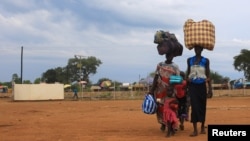South Sudanese refugees who fled to neighboring Uganda from Morobo County in the Yei River State of South Sudan last week say people are dying in the refugee camps.
They fled during fighting between government forces and an armed group, and they are calling on the government to meet with the armed group, learn its grievances and negotiate a peaceful resolution.
Civilians from Morobo County say the main road linking Uganda and South Sudan is impassible because gunmen are blocking it.
Most people fleeing the area pass through the Democratic Republic of Congo (DRC) before crossing into Uganda, a distance of about 50 kilometers.
Morobo resident Moro Moses fled the area on foot with his two wives and two children last weekend following the renewed violence. He said he is hopeful that peace returns to South Sudan so that he can go home with his family.
“We don't expect that incident to happen,” Moses said. “Otherwise we could be at our place called South Sudan. But due to this incident, it has made everybody scared and even to flee out of South Sudan. We are just praying that everything at least can be successful so that we can at last return."
On Monday evening, Moses and his family were relocated to the Bidi Bidi refugee camp in northern Uganda.
Two days ago, Luiza Dawa fled Morobo County through the DRC to Uganda and she also said most of the roads in South Sudan are occupied by gunmen, making them too insecure for civilians to travel.
“The rebels are really around Morobo County,” Dawa said. “There are still some people who are left but they are on the other side of Congo. What I have to say is that people have to leave that place because it's really so dangerous and many people are losing their life right now."
Luka Remo also fled Morobo County during the fighting and is now in Uganda's Koboko District. Remo said only when the two warring parties cease hostilities will he return to South Sudan.
“If the people are going back, I will go back even tomorrow. Let's struggle, then we work for peace and people return and settle together like before and we stay there in Morobo," Remo said.
Most of the South Sudanese fleeing Morobo have been taken to the Bidi Bidi refugee settlement of Yumbe District in northern Uganda.
Last week, some South Sudanese refugees from Morobo said at least six children died in the past month from poor health services in the refugee camps in northern Uganda's Arua District.
The refugees warn the situation in the camps may worsen because there are increased cases of acute diarrhea and malaria.
Mawa George Lazarus is executive director for Community Empowerment for Rehabilitation and Development, a local civil society organization in Yei.
Lazarus said conflicts continue in South Sudan because the warring parties aren’t talking to each other.
“We tend to act when we are angry,” Lazarus said. “And we don't give chance for dialogue to prevail, and that's what gets ourselves to messes. I would really urge that when we try to think about national issues and issues of our country, we need to drop down our personal beings and our self-interests,”
Lazarus added that he believes the deployment of additional United Nations troops across the entire country will help deter clashes between the parties.
“South Sudan itself is not Juba,” he said. “Juba is just the capital city, so consolidating these troops in Juba will mean that the other locations that are currently experiencing hardships will still be witnessing a kind of insecurity. So it's important the key locations, key towns, are also part of this process, especially Yei.”
The government of South Sudan recently approved the U.N.'s decision to send a 4,000-strong regional protection force to help end the violence in parts of the country, which flared up in Juba in July.
Fighting broke out six months ago in the Yei River State's Morobo, Lainya and Kajo Keji counties.
Last month, the U.N. said about 100,000 Yei residents were stranded in the town with no means of escape.





